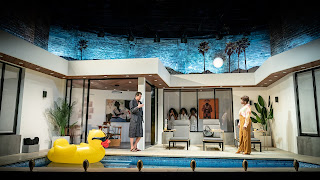Andre has a Bel Air house full of art that many galleries would kill for - exactly how his family got their money is sketchy, but he spends it indulging his passion for collecting art, which he enjoys on a superficial level and as investments, but doesn't seem to care much about its meaning.
Franklin has soon moved in with Andre, and while the latter is wary of defining their relationship as boyfriends, their sex life quickly leans into the sugar-daddy cliché: They start calling each other "Daddy" and "Son," Andre develops a sexually dominant role, and the erudite Franklin takes on an infantilised persona. He practically moves his best friends in, but while Bellamy (Ioanna Kimbook) enjoys it so much she starts looking for a sugar-daddy of her own, Max (John McCrea) is suspicious of Andre (though this may be more because he's in love with Franklin himself.) Finally and most explosively, Franklin's bible-thumping mother Zora (Sharlene Whyte) arrives to stay for the exhibition's opening.
"Daddy" definitely shows signs of why Harris is causing so much excitement as a playwright, while also showing definite giveaways that it's an early work: It's hugely ambitious both in terms of story and stylistically, and the fact that it almost manages to get away with everything it throws at the stage shows Harris has the talent to back it up - but it doesn't quite come together. Director Danya Taymor juggles the demands of a play that, as its "melodrama" tag implies, has a baseline feel of a glossy soap, but with an underscore of the surreal that sometimes comes much more to the surface - Zora comes complete with a gospel choir (Rebecca Bernice Amissah, Keisha Atwell, T'Shan Williams) who then get requisitioned by Franklin's brain as a kind of Greek chorus for his thoughts.
Matt Saunders' set is dominated by a real swimming pool* that serves as constant reminder of the setting's opulence, baptism metaphor, and overt reference to David Hockney's homoerotic paintings (Franklin and Andre first meet at a Hockney retrospective.) It's the setting for the well-publicised (the ushers even hand out stickers to go over the audience's phone cameras in case they get any ideas)from Jarrett and Bang, their physical relationship constantly jumping from sexy to creepy and back (helped by Lee Kinney's electronic score channelling '70s horror movies, another of the diverse influences on the play's moods.)
If Harris is a playwright who revels in throwing the contentious issues of sex and race together, then "Daddy" eventually resolves itself into a story about age-gap gay relationships and how they tie into the stereotype of black men leaving their children; in Franklin's case, there's the additional element of how Zora talked to his father on the one occasion he saw him, and how this has bled into a lot of his insecurities: If his mother actively hates his father, how can she really feel about a son who shares 50% of his DNA and apparently looks a lot like him? The other thematic left-turn is the ongoing discussion of art: We've had little hints in the fact that, Brimstone and Treacle-like, Franklin appears to be the only character with some awareness that the audience is there, that this may be more about his relationship with the inside of his own head than about any of the other relationships we see. Harris hangs a lantern on the narcissistic side of autobiographical art when, as Max points out, he casts his friends as supporting characters in his own life and art.
These final-act turns in the play's themes are why I can only call it almost successful at pulling everything together: As well as causing a mild case of Multiple Ending Syndrome as Franklin overstates the story's conclusions, it also means a lot of the misdirection along the way is left hanging; there's only so many red herrings you can plant before they become a collection of loose ends. Unsurprisingly, a lot of these involve the titular "Daddy" - the idea that Andre is some kind of unmentionable Kaiser Söze of the art world is a hell of a subplot to leave unresolved, as is the question over whether his one-dimensional appreciation of art applies to his young partner as well. But from borderline horror to a surreal, painfully on-the-nose karaoke rendition of "Father Figure" it's been an interesting ride along the way, and if Harris' more recent works have managed to bring in some of the focus "Daddy" lacks, it explains a lot of the hype.
Daddy" A Melodrama by Jeremy O. Harris is booking until the 30th of April at the Almeida Theatre.
Running time: 2 hours 55 minutes including interval.
Photo credit: Marc Brenner.
*a well-chlorinated one, judging by the way McCrea's hair gets pinker as the evening goes on






No comments:
Post a Comment